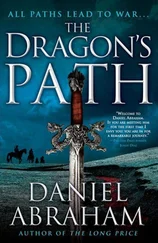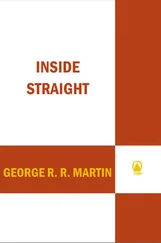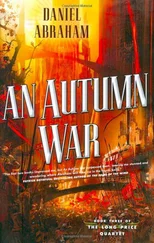Daniel Abraham - THE
Здесь есть возможность читать онлайн «Daniel Abraham - THE» весь текст электронной книги совершенно бесплатно (целиком полную версию без сокращений). В некоторых случаях можно слушать аудио, скачать через торрент в формате fb2 и присутствует краткое содержание. Жанр: Фэнтези, на английском языке. Описание произведения, (предисловие) а так же отзывы посетителей доступны на портале библиотеки ЛибКат.
- Название:THE
- Автор:
- Жанр:
- Год:неизвестен
- ISBN:нет данных
- Рейтинг книги:3 / 5. Голосов: 1
-
Избранное:Добавить в избранное
- Отзывы:
-
Ваша оценка:
- 60
- 1
- 2
- 3
- 4
- 5
THE: краткое содержание, описание и аннотация
Предлагаем к чтению аннотацию, описание, краткое содержание или предисловие (зависит от того, что написал сам автор книги «THE»). Если вы не нашли необходимую информацию о книге — напишите в комментариях, мы постараемся отыскать её.
THE — читать онлайн бесплатно полную книгу (весь текст) целиком
Ниже представлен текст книги, разбитый по страницам. Система сохранения места последней прочитанной страницы, позволяет с удобством читать онлайн бесплатно книгу «THE», без необходимости каждый раз заново искать на чём Вы остановились. Поставьте закладку, и сможете в любой момент перейти на страницу, на которой закончили чтение.
Интервал:
Закладка:
difficult in sunlight; by fire and candle, it might as well not have
been written. Frustrated, Maati turned the pages and an eye stared back
at him from the paper. He turned back and went more slowly. All the
diagrams were of eyes, some ripped from their sockets, some pierced by
careful blades. Comments accompanied each orb, laying, he assumed, its
secrets open.
"Sight," Eiah said. "The author is called Arran, but it was more likely
written by dozens of people who all used the same name. The wardens in
the north had a period four or five generations ago when there was some
brilliant work done. We ignored it, of course, because it wasn't by us.
But these are very, very good. Arran was brilliant."
"Whether he existed or not," Maati said. He meant it as a joke.
"Whether he existed or not," Eiah agreed with perfect seriousness. "I've
been working with these. And with Vanjit. We have a draft. You should
look at it."
Maati handed her back the book and she pulled a sheaf of papers from her
sleeve. Maati found himself almost hesitant to accept them. Vanjit, and
her dreamed baby. Vanjit, who had lost so much in the war. He didn't
want to see any of his students pay the price of a failed binding, but
especially not her.
He took the papers. Eiah waited. He opened them.
The binding was an outline, but it was well-considered. The sections and
relationships sketched in with commentary detailing what would go in
each, often with two or three notes of possible approaches. The andat
would be Clarity-of-Sight, and it would be based in the medical
knowledge of Westlands physicians and the women's grammar that Maati and
Eiah had been creating. Even if some Second Empire poet had managed to
hold the andat before, this approach, these descriptions and
sensibilities, was likely to be wholly different. Wholly new.
"Why Vanjit?" he asked. "Why not Ashti Beg or Small Kae?"
"You think she isn't ready?"
"I ... I wouldn't go so far as that," Maati said. "It's only that she's
young, and she's had a harder life than some. I wonder whether ..."
"None of us are perfect, Maati-kya," Eiah said. "We have to work with
the people we have. Vanjit is clever and determined."
"You think she can manage it? Bind this andat?"
"I think she has the best hope of any of us. Except possibly me."
Maati sighed, nodding as much to himself as to her. Dread thickened his
throat.
"Let me look at this," he said. "Let me think about it."
Eiah took a pose that accepted his command. Maati looked down again.
"Why didn't he come?" Eiah asked.
"Because," Maati began, and then found he wasn't able to answer as
easily as he'd thought. He folded the papers and began to tuck them into
his sleeve, remembered how wet the cloth was, and tossed them instead
onto his low, wood-framed bed. "Because he didn't want to," he said at last.
"And my aunt?"
"I don't know," Maati said. "I thought for a time that she might take my
side. She didn't seem pleased with how they were living. Or, no. That's
not right. She seemed to care more than he did about how they would live
in the future. But he wouldn't have any of it."
"He's given up," Eiah said.
Maati recalled the man's face, the lines and weariness. The authenticity
of his smile. When they'd first met, Cehmai had been little more than a
boy, younger than Eiah was now. This was what the world had done to that
boy. What it had done to them all.
"He has," Maati said.
"Then we'll do without him," Eiah said.
"Yes," Maati said, hoisting himself up. "Yes we will, but if you'll
forgive me, Eiah-kya, I think the day's worn me thin. A little rest, and
we'll begin fresh tomorrow. And where's that list of questions? Ah,
thank you. I'll look over all of this, and we'll decide where best to go
from here, eh?"
She took his hand, squeezing his knuckles gently.
"It's good to have you back," she said.
"I'm pleased to be here," he said.
"Did you have any news of my father?"
"No," he said. "I didn't ask. It's the first rule of running a race,
isn't it? Not to look back at who's behind you?"
Eiah chuckled, but didn't respond otherwise. Once she'd left and Maati
had banked the fire, he sat on the bed. The night candle stood straight
in its glass case, the burning wick marking the hours before dawn. It
wasn't to its first-quarter mark and he felt exhausted. He moved the
papers and the scroll safely off the bed, pulled the blanket up over
himself, and slept better than he had in weeks, waking to the sound of
morning birds and pale light before dawn.
He read over the list of questions on the scroll, only surveying them
and not bothering to think of answers just yet, and then turned to the
proposed binding. When he went out, following the smells of wood smoke
and warmed honey, his mind was turning at twice its usual speed.
They had made a small common room from what had once been the teachers'
cells, and Irit and Large Kae were sitting at the window that Maati
remembered looking out when he had been a child called before Tahi-kvo.
Bald, mean-spirited Tahi-kvo, who would not have recognized the world as
it had become; women studying the andat in his own rooms, the poets
almost vanished from the world, Galts on the way to becoming the nobles
of this new, rattling, sad, stumble-footed Empire. Nothing was the same
as it had been. Everything was different.
Vanjit, sitting with her legs crossed by the fire grate, smiled up at
him. Maati took a pose of greeting and lowered himself carefully to her
side. Irit and Large Kae both glanced at him, their eyes rich with
curiosity and perhaps even envy, but they kept to their window and their
conversation. Vanjit held out her bowl of cooked wheat and raisins, but
Maati took a pose that both thanked and refused, then changed his mind
and scooped two fingers into his mouth. The grain was rich and salted,
sweetened with fruit and honey both. Vanjit smiled at him; the
expression failed to reach her eyes.
"I looked over your work. Yours and Eiah-cha's," he said. "It's
interesting."
Vanjit looked down, setting the bowl on the stone floor at her side.
After a moment's hesitation, her hands took a pose that invited his
judgment.
"I . . ." Maati began, then coughed, looked out past Large Kae and Irit
to the bright and featureless blue of the western sky. "I don't want to
hurry this. And I would rather not see any more of you pay the price of
falling short."
Her mouth tightened, and her eyebrows rose as if she were asking a
question. She said nothing.
"You're sure you want this?" he asked. "You have seen all the women
we've lost. You know the dangers."
"I want this, Maati-kvo. I want to try this. And ... and I don't know
how much longer I can wait," she said. Her gaze rose to meet his. "It's
time for me. I have to try soon, or I think I never will."
"If you have doubts about-"
"Not doubts. Only a little despair now and then. You can take that from
me. If you let me try." Maati started to speak, but the girl went on,
raising her voice and speaking faster, as if she feared what he would
say next. "I've seen death. I won't say I'm not afraid of it, but I'm
not so taken by the fear that I can't risk anything. If it's called for."
"I didn't think you were," he said.
"And I helped bury Umnit. I know what the price can look like. But I
buried my mother and my brother and his daughter too, and they didn't
Читать дальшеИнтервал:
Закладка:
Похожие книги на «THE»
Представляем Вашему вниманию похожие книги на «THE» списком для выбора. Мы отобрали схожую по названию и смыслу литературу в надежде предоставить читателям больше вариантов отыскать новые, интересные, ещё непрочитанные произведения.
Обсуждение, отзывы о книге «THE» и просто собственные мнения читателей. Оставьте ваши комментарии, напишите, что Вы думаете о произведении, его смысле или главных героях. Укажите что конкретно понравилось, а что нет, и почему Вы так считаете.










